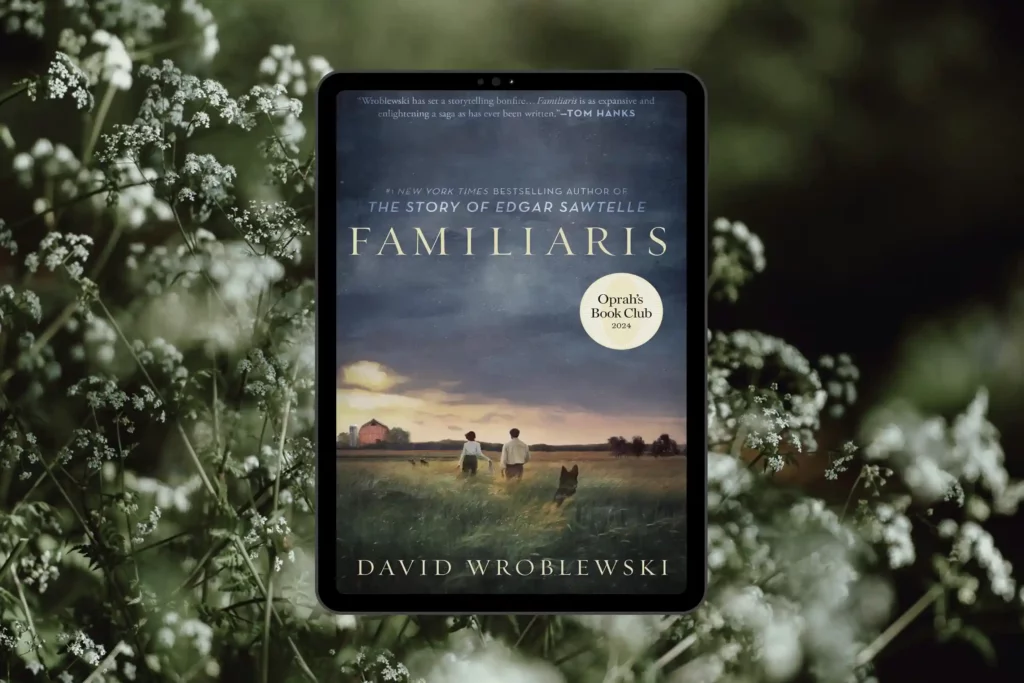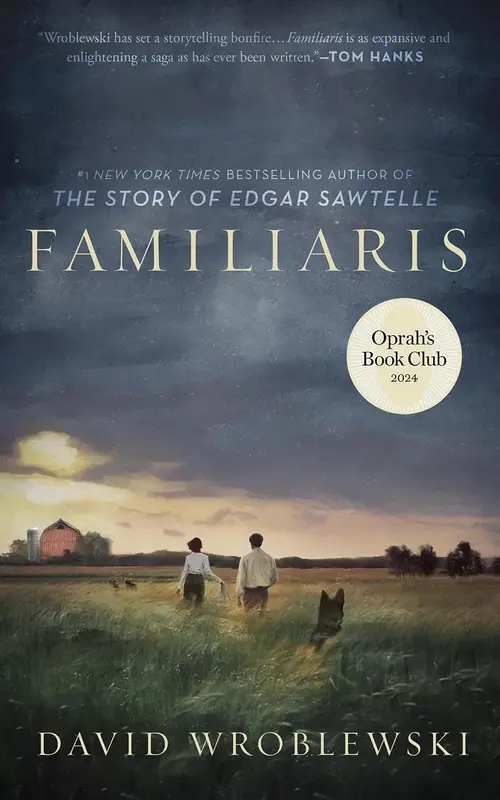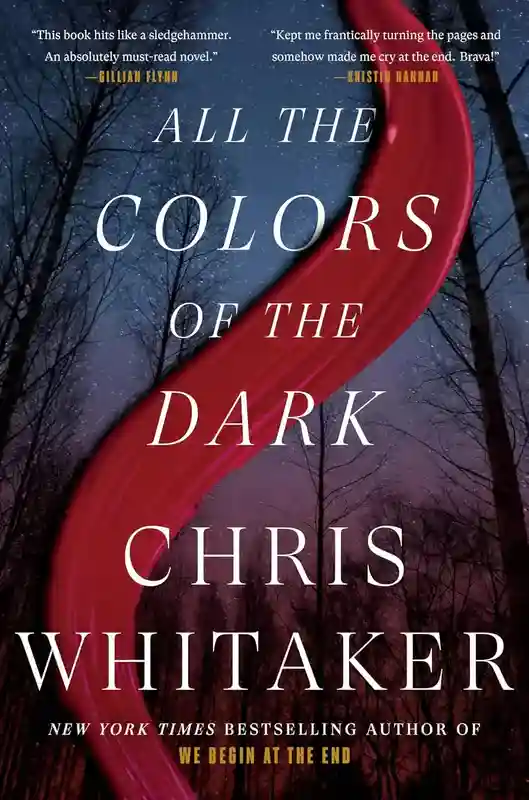As the follow up to the New York Times bestselling classic – The Story of Edgar Saw, Familiaris was voted as Oprah’s 106 book club pick in 2024, but it’s also a book that will make your group members smile while still providing ample opportunities for discussion.
If you haven’t yet read the book, skip down to the Summary & Review sections at the bottom to read a synopsis of Familiaris. We’ve also included reviews from our readers to help you decide if it’s right for your book club.

- What’s Included in This Guide: Online & Printable Versions
- Familiaris
- Familiaris Book Reviews
- Familiaris Characters
- Book Club Questions for Familiaris
- Q&A about Familiaris with David Wroblewski
- David Wroblewski Author Biography
- Familiaris Book Club Food Ideas
- Familiaris Book Club Beverage Ideas
- Familiaris Book Club Decor Ideas
- Quotes From Familiaris
- Frequently Asked Questions
- Books Like Familiaris
- Familiaris Summary
- Familiaris Review
- Printer Friendly Version
- More Book Club Guides
What’s Included in This Guide: Online & Printable Versions
Everything you need for a successful book club meeting for Familiaris is included below. You’ll find discussion questions, food and drink ideas, and more!
We also have an optional printable Familiaris book club kit to take your meeting to the next level. This blog post is customized to Familiaris and includes the following pages:
- Character List
- Discussion Questions
- Quotes from the Book
- Themed Icebreaker Ideas
- Printable Bookmarks
- Extra Info: Author facts
- Themed Food & Drink Ideas
- Book Covers from Around the World
- Custom Journal Page for Meeting Details
- Themed Notes Page
- List of Additional Book Club Resources
About the Author | Q&A with David Wroblewski
Book Club Questions | Additional Recommendations | Book Club Kit
Familiaris

Familiaris is the origin story of the Sawtelle family and their extraordinary dogs. Set in 1919, it follows John Sawtelle and his wife Mary as they move to the north woods of Wisconsin to start a new life with their friends and dogs. Along the way they face many challenges in this strange and dangerous place, and have to rely on their creativity and new friends (both human and animal) to succeed.
The book is a mix of humor, heartbreak, mystery, and enchantment. It takes us through various adventures – including life in a small-town factory, a massive firestorm, and a World War II dog training program.
Familiaris by David Wroblewski

Release date: June 11, 2024
Genre: Family Saga Fiction
Hardcover: 992 pages
Publisher: Blackstone Publishing Inc
Familiaris Book Reviews

“By taking us back to the origins of the Sawtelle family, Wroblewski has set a storytelling bonfire as enthralling in its pages as it is illuminating of our fragile and complicated humanity. Familiaris is as expansive and enlightening a saga as has ever been written.” —Tom Hanks, Academy Award–winning actor
“Already having drawn comparisons to Russo, Irving, Strout, McCarthy, and Gilbert, with García Márquez added here, Wroblewski earns them all, amply rewarding readers who have been waiting impatiently for fifteen years…This colossus of a book will own you, and you will weep to be freed.” —Kirkus Reviews (starred review)
Familiaris Characters
These are the key characters that bring Familiaris to life. Keep this list handy as a quick reference during your discussions—it’ll help keep track of who’s who as you delve into conversations.
- John Sawtelle – The leader and dreamer of the Sawtelle family. John shows strength and determination as he turns a neglected farm in northern Wisconsin into a successful home. His strong connection to the land helps him overcome challenges, driven by a deep sense of responsibility to his family and community.
- Mary Sawtelle – John’s wife and partner in their wilderness adventure. Mary brings caring and practical wisdom to the family. Her love for nature and steadfast support sustain the Sawtelle homestead through tough times and happy moments.
- Edgar Sawtelle – The main character, born into the legacy of the Sawtelle dogs. Edgar is a sensitive and perceptive young man with a close bond to the dogs his family raises. His journey to adulthood is marked by heartbreak and a search for identity, struggling to find his place in the Sawtelle family amidst complex relationships.
- The Sawtelle Dogs – Faithful companions bred by the Sawtelle family for generations. Each dog has its own personality and traits, reflecting their strong bond with their human owners. They play a key role in the Sawtelle family’s life and explore themes of loyalty, trust, and the connection between humans and animals.
- Elbow – A skilled handyman and close friend of the Sawtelles. Elbow’s practical skills and unwavering loyalty make him a vital member of the community. He embodies hard work and friendship, offering steady support to John and Mary in their endeavors.
- Frank – A World War I veteran dealing with personal struggles. Frank finds peace and purpose in his friendship with the Sawtelles, contributing his skills and experiences to the farm’s growth. His journey echoes the novel’s themes of strength and redemption.
We hope this character list is a helpful reference as you prepare to discuss the book.
Book Club Questions for Familiaris
- For those of you who have also read Wroblewski’s debut novel, how did the events of FAMILIARIS enhance your understanding of Gar and Claude’s relationship and their family history?
- The Peshtigo fire was a real event that occurred in Wisconsin on October 8, 1871. Its place in history is overshadowed by the Great Chicago Fire, which started on the very same day. Had you heard of the Peshtigo fire before reading FAMILIARIS? How does the inclusion of this historical event impact the story?
- Do any of the canine characters in FAMILIARIS remind you of a dog that has been part of your life? How do these dogs influence the story and the characters’ lives?
- The friendship between John and Frank is tested throughout the book. How does their dynamic change over the course of their lives? What events or realizations drive these changes?
- Oprah described the book as brilliantly intertwining history, philosophy, adventure, and mysticism. Which aspect of the story (history, philosophy, adventure, mysticism) resonated most with you, and why?
- Wroblewski spoke about Edgar’s grandfather, John, emerging as a significant character while writing “Edgar Sawtelle.” How did you perceive John’s character evolution throughout “Familiaris”? Did you find him as intriguing as Wroblewski did?
- In your opinion, what does Ida want? What does Nyx want? Do they work together, or are they often at cross purposes? Who is in control?
- There are many pair-wise relationships in the novel: John and Mary, So Jack and Granddaddy, John and Elbow, Walter and Ida, etc. How can each of these be thought of as a love story? Which relationship resonated most with you?
- What is Elbow’s relationship to wood? How does his work speak for him? Similarly, what about Frank’s relationship to food? How do their crafts define their characters?
- At the end of Part III, John dreams of the first dogs who lived alongside humans. What does this dream mean to you? What do you think it means to John?
- Claude brings chaos and deceit to his relationships. In your opinion, does his darkness come from within or without, and is this a universal trait? How do you interpret his character’s actions and motivations?
- If you could have a conversation with your younger self and your older self, as John does with Ida’s help in Part III, what would you want to say? How might these conversations alter your perspective on your current life?
- The categories the Sawtelles use to classify their dogs — Searcher, Consoler, Challenger, Defender — can also be used to describe the human characters in the story. How would you assign these roles to the characters? Do some characters fit more than one role?
- Wroblewski mentioned John being born with “an extra share of whimsy.” How do you interpret this whimsy in John’s actions and decisions? Do you see whimsy as a strength or a challenge for him?
- John, Mary, Gar, and Claude are a family of extremely talented dog trainers, and the reader gets a detailed look at that process. Did any aspects of their work surprise you? What did you learn about the bond between humans and dogs from these sections?
- How does the author differentiate each canine character from the others? Do you have a favorite canine character in FAMILIARIS, and why?
- Watching the Sawtelles and their friends over decades explores the broader contours of life experience — starting with their big dreams as they seek what Drencher would call their “singularism.” Do you feel that the characters achieved a version of their dreams? Would Drencher say so?
- The part-human, part-supernatural character known to the Sawtelles as Ida Paine powerfully redirects several events, changing their outcomes and effectively turning back time. Do you see Ida as a force for good, or something more complicated?
- How does the farm environment shape the narrative and the characters’ lives? Have you ever felt a strong connection to a particular place that influenced your life significantly?
- The book is divided into five great quests. Which quest did you find most impactful, and why? How do these quests mirror the real-life journeys people undertake?
- John convinces his friends to join him on his quests by asking, “Suppose you could do one impossible thing.” What impossible thing would you choose to do, and why?
- In the prologue, David Wroblewski writes, “The same would be true for each of the great quests in John Sawtelle’s life.” How would you describe the great quests in John Sawtelle’s life? Which quest did you find most compelling, and why?
- Mary is the strong, sensible, joyful backbone of the Sawtelle farm. She is talented at rerouting a conversation or course of action to a better result — at times she is an agitator, at times a peacekeeper. Which events in the book are changed by her intervention, and how does her character influence the overall story?
- John often uses the prompt, “Suppose you could do one impossible thing.” This phrase becomes his ethos for approaching life’s challenges. How does each character interpret it? How would you interpret this phrase in your own life?
- The text Practical Agriculture and Free Will by the fictional thinker George Solomon Drencher turns up regularly in FAMILIARIS, quoted sincerely by John and as a punch line by others. The characters find guidance in its passages despite its overblown verbosity. How does the book unify the characters’ life stages? Did any Drencherian quotes stand out to you for their strange practicality?
- Throughout the novel, So Jack encourages many characters to have heart-to-heart conversations with Granddaddy. Why do you think he does this, and how do the characters benefit from these conversations?
- How did you envision the dogs while reading, and why? What role do you think dogs play in conveying the themes of family and loyalty in the story?
- The title “Familiaris” has multiple meanings, including family and canine connections. How do you see these dual meanings reflected in the story? Do you agree with Wroblewski’s choice of title?
- If you have read “The Story of Edgar Sawtelle,” how does “Familiaris” change or enhance your understanding of the Sawtelle family? If you haven’t read it, how do you think the prequel stands on its own?
- Why does Claude decide to leave at the end of Part IV? What might he fear about staying? Do you think he made the right decision?
- What does the novel say to you about friendship? What about love? Grief? How do these themes intertwine and influence the characters’ lives?
- The book explores living one’s true purpose. How do the characters’ quests reflect their search for meaning? Can you relate to their journeys in your own search for purpose?
- Think about active mourning versus passive mourning, especially as it relates to John. How do these forms of mourning affect his actions and relationships?
- Compare John’s time at the rooming house with his time at the farm. What kind of community does John create in each place? How do these communities reflect his character and growth?
- What does it tell you about John’s character that he never tells Frank the truth about the necker knob? Do you think Frank knows this, consciously or unconsciously?
- Which character do you most relate to, and why? How do their experiences mirror or differ from your own?
- Discuss the following terms as they relate to the novel: agency, choice, fate, optimism, creation, knowledge, yearning. How do these themes drive the characters’ actions and shape the narrative?
- Wroblewski drew on his own experiences growing up on a farm in Wisconsin. How do you think his personal background enhanced the authenticity of the setting and characters in “Familiaris”? Can you relate any specific scenes to your own experiences?
- Based on the ending of “Familiaris,” what future quests do you envision for John or other characters? How do you think their stories would continue beyond the book?
Q&A about Familiaris with David Wroblewski
Q: What was your reaction to being selected for Oprah’s Book Club again after so many years?
A: I think I expected it even less now than I did then. I was H fled back in 2008, and I was just completely dumbfounded at this point because I didn’t expect this to happen twice. It’s like hitting a lottery twice or being struck by lightning, the best kind of lightning.
Q: Why did you decide to write a prequel to “The Story of Edgar Sawtelle”?
A: While I was writing Edgar, this character of Edgar’s grandfather kept showing up in the book and wanting to play a bigger role than he deserved to play in that book. This happens in writing where you have to set things aside because it’s not good for the book itself. But that kept happening, and I finally said if when I finished Edgar, if John is still interesting, then he gets his own book, and he was.
Q: What inspired the character of Edgar’s grandfather in the new book?
A: I was completely taken with him partly because of the way he’s introduced in Edgar, as having been born with an extra share of whimsy. There was a part of me that wanted to know what I meant by that because at the time it was meant to be an instantaneous portrait of who he was, so that people would have a sense of his personality.
Q: How did your experiences growing up on a farm in Wisconsin influence the book?
A: When I wrote Edgar, I decided to take our family farm, evacuate all the real people, and put in all new people to play out a story that I had in mind. I used our farm as a setting, relocated it north by about 100 miles, and exaggerated its qualities. The barn in the story is the barn I remember crawling around in as a little kid, and the house is a variant of the house that I grew up in.
Q: Can you explain the concept of the five quests in the book?
A: I wanted to tell John’s entire life story, and I knew it was going to cover 40 some years. I didn’t want to do that just chronologically, so I divided his life up into what I call the five great quests that his life goes through because it seems like that’s the way life works.
Q: What does the title “Familiaris” signify
A: The title “Familiaris” is from the Latin binomial for dog, canis familiaris, but also the word family is embedded in there. Familiaris refers to people who are close and the root of the word family is people around the house.
Q: What do the dogs in the story look like?
A: I’m not going to tell you that, and here’s why. There’s a certain division of labor that I tried to put in Edgar and carry through here. I want readers to be able to imagine how the dogs look themselves, allowing them to paint the picture. One of the really fun things about talking to people after Edgar came out was that people would say their dog is definitely a Sawtelle dog, whether it’s a Chihuahua or a Mastiff.
David Wroblewski Author Biography

David Wroblewski is the author, most recently, of the novel Familiaris, his followup to the internationally bestselling The Story Of Edgar Sawtelle, an Oprah Book Club pick, Barnes and Noble Discover Great New Writers selection, winner of the Colorado Book Award, Indie Choice Best Author Discovery award, and Midwest Bookseller Association’s Choice award, in addition to being selected as one of the best books of the year by numerous magazines and newspapers.
David received an M.F.A. in Creative Writing from the Warren Wilson M.F.A. Program for Writers, and a Bachelor’s degree in computer science from the University of Wisconsin. He lives in Colorado with the writer Kimberly McClintock and their dogs, Pie and Luci.
Familiaris Book Club Food Ideas
Our suggestions would be to embrace the rustic charm of northern Wisconsin by serving dishes made with locally sourced ingredients. Think hearty stews, roasted vegetables, and dishes that reflect the simplicity and bounty of farm life portrayed in Familiaris.
Likewise, create a platter featuring artisanal cheeses, cured meats, fresh bread, and local preserves. This can be as simple or as fancy as you’d like!
Familiaris Book Club Beverage Ideas
Local Craft Beers and Ciders: Offer a selection of craft beers and ciders brewed in Wisconsin. Some examples:
1. Wisconsin Red Ale: A robust ale which is brewed with locally sourced hops and malt
2. Sawtelle Farmhouse Cider: A cider made from apples grown in Wisconsin orchards,
3. Lake Country IPA: A hop-forward IPA brewed with hops from the nearby Lake Country region, which is also known for its piney and citrusy notes.
Hot Apple Cider: Serve warm apple cider with cinnamon sticks. This cozy drink will evoke the comforting atmosphere of the Sawtelle homestead and enhance your book club discussions. The apple cider also symbolizes the cycles of nature and growth central to the novel, reminding us of the seasons and the passage of time.
Familiaris Book Club Decor Ideas
Rustic Farmhouse Setting: Create a cozy ambiance with wooden accents, mason jars filled with wildflowers, and vintage farm tools. These decorations will transport you to the rugged beauty of the Wisconsin wilderness.
Nature-inspired Centerpieces: Use pine cones, seasonal berries, and greenery to craft centerpieces that bring the outdoors inside.
Quotes From Familiaris
The following quotes from the book would each make a great talking point as part of a book club discussion. Be sure to bring any quotes you highlighted along the way as well.
“In the quiet of that morning, he made his first plan of the things he wanted to do, and how he wanted to do them.”
“For the most part, people looked after themselves, but if they needed something, they’d get together and help each other out.”
“Each of the Sawtelles had a dog that was theirs, which was only fair since each of the dogs had a person they belonged to.”
“Through laughter and tears, they discovered that a family is not just blood, but those who stand beside you in the toughest of times.”
Frequently Asked Questions
Can I Get a Printable Version of the Book Club Guide?
Yes! We have a printable version, just scroll down below.
Is There a Familiaris Audiobook?
Yes, there is an audiobook version of Familiaris by David Wroblewski.
Narrated by: Richard Poe
Released: June 11, 2024
Listening length: 37 hours and 12 minutes
Language: English
The Audiobook is available on platforms like Audible, and it has been well-received, ranking highly in categories such as Magical Realism Fiction and Fiction Sagas on Audible’s best sellers list. Check Amazon for more info.
Is There a Familiaris Movie?
There has been no movie adaptation of Familiaris released as of now. The novel has not been adapted into a film, so there is no official movie based on David Wroblewski’s book.
What Are Some Other Books Like Familiaris?
Some books you might enjoy are:
The Story of Edgar Sawtelle by David Wroblewski (if you haven’t read it already)
A Dog’s Purpose by W. Bruce Cameron
The Art of Racing in the Rain by Garth Stein
The Dogs of Babel by Carolyn Parkhurst
The Call of the Wild by Jack London.
For latest books, scroll down below.
Are There Other Books by David Wroblewski?
Other than The Story of Edgar Sawtelle, David has not published any other books.
Books Like Familiaris
Same As It Ever Was by Claire Lombardo

Featuring a memorably messy family and the multifaceted marriage at its heart, Lombardo’s debut was dubbed “the literary love child of Jonathan Franzen and Anne Tyler” (The Guardian) and hailed as “ambitious and brilliantly written” (Washington Post). In this remarkable follow-up—another elegant and tumultuous story in the tradition of Elizabeth Strout, Ann Patchett, and Celeste Ng—Lombardo introduces us to an unforgettable cast of characters, this time by way of her singularly complicated protagonist.
Julia Ames, after a youth marked by upheaval and emotional turbulence, has found herself on the placid plateau of mid-life. But Julia has never navigated the world with the equanimity of her current privileged class. Having nearly derailed herself several times, making desperate bids for the kind of connection that always felt inaccessible to her, she finally feels, at age fifty seven, that she has a firm handle on things.
She’s unprepared, though, for what comes next: a surprise announcement from her straight-arrow son, an impending separation from her spikey teenaged daughter, and a seductive resurgence of the past, all of which threaten to draw her back into the patterns that had previously kept her on a razor’s edge.
Swan Song by Elin Hilderbrand

The beloved #1 New York Times bestselling author brings her Nantucket novels to a brilliant finish: when rich strangers move to the island, social mayhem—and a possible murder follow. Can Nantucket’s best locals save the day, and their way of life?
Chief of Police Ed Kapenash is about to retire. Blond Sharon is going through a divorce. But when a 22-million-dollar summer home is purchased by the mysterious Richardsons—how did they make their money, exactly?—Ed, Sharon, and everyone in the community are swept up in high drama. The Richardsons throw lavish parties, flirt with multiple locals, flaunt their wealth with not one but two yachts, and raise impossible hopes of everyone they meet. When their house burns to the ground and their most essential employee goes missing, the entire island is up in arms.
The last of Elin Hilderbrand’s bestselling Nantucket novels, Swan Song is a propulsive medley of glittering gatherings, sun-soaked drama, wisdom and heart, featuring the return of some of her most beloved characters, including, most importantly, the beautiful and timeless island of Nantucket itself.
All the Colors of the Dark by Chris Whitaker

1975 is a time of change in America. The Vietnam War is ending. Muhammad Ali is fighting Joe Frazier. And in the small town of Monta Clare, Missouri, girls are disappearing.
When the daughter of a wealthy family is targeted, the most unlikely hero emerges—Patch, a local boy, who saves the girl, and, in doing so, leaves heartache in his wake.
Patch and those who love him soon discover that the line between triumph and tragedy has never been finer. And that their search for answers will lead them to truths that could mean losing one another.
A missing person mystery, a serial killer thriller, a love story, a unique twist on each, Chris Whitaker has written a novel about what lurks in the shadows of obsession and the blinding light of hope.
Familiaris Summary
From 1919 to 1961, the story of Familiaris follows John Sawtelle, Edgar’s grandfather, who goes into the Wisconsin wilderness with his wife Mary and their three loyal dogs.
It all starts with John and Mary’s bold choice to settle on a rundown farm in northern Wisconsin. Despite money troubles and the huge task of fixing up the land, they meet various people who become important in their lives. Elbow (a skilled handyman), and Frank, (a World War I vet dealing with his own struggles), pitch in to help John build a thriving farm.
As the farm grows, so does the community around it, with new friendships forming and lasting bonds being made. At its core, Familiaris dives into how deeply the land affects its residents, showing John and Mary’s farm as a place where everyone finds healing & personal growth. Over the years, the Sawtelles face challenges and joys. All while sharing a special connection with their dogs – who play a crucial role in their lives.
Familiaris Review
I absolutely loved the author’s writing style, so I was super excited when I heard a sequel (or “origin story”) to The Story of Edgar Sawtelle was finally being published! My excitement carried me through the first few hundred pages. The story itself, along with the writing, kept me engaged until the end. I do think the part about John and Mary Sawtelle (and their dogs) could have been shorter, but overall, the story was interesting from start to finish, although the last 90 pages nearly broke me.
Overall, I found this book to be a worthy sequel. My only issue was a part in the middle where the author described dog fighting. It seemed like he was oddly poetic about it, which felt strange given his obvious love for dogs.
Honestly, if you loved The Story of Edgar Sawtelle, you’ll definitely enjoy Familiaris.
Printer Friendly Version
We hope you found this book club guide helpful!
As a reminder, you can get the guide in a print-friendly format for your book club meeting below!
More Book Club Guides
If you’re planning ahead to your next book club pick, consider selecting another book from our list of guides to make your meeting preparation easy and fun!
Book Club Questions and Discussion Guide for First Lie Wins by Ashley Elston
Book Club Questions and Discussion Guide for The Waters by Bonnie Jo Campbell
Discussion Guide and Book Club Questions for The Wager by David Grann
Book Club Questions for The Heiress by Rachel Hawkins & Discussion Guide
Discussion Guide and Book Club Questions for The Women by Kristin Hannah
Book Club Questions and Discussion Guide for Everyone Here Is Lying by Shari Lapena
Book Club Questions for Family Family by Laurie Frankel and Discussion Guide
Discussion Guide and Book Club Questions for Only If You’re Lucky by Stacy Willingham
Book Club Questions for An American Beauty by Shana Abe + Book Club Kit
Book Club Questions for The Poisonwood Bible by Barbara Kingsolver
Book Club Questions for Within Arm’s Reach by Ann Napolitano (with Discussion Guide)
The Housemaid: Plot Summary and Ending Explained (+ FAQ)
Happy reading! ❤️